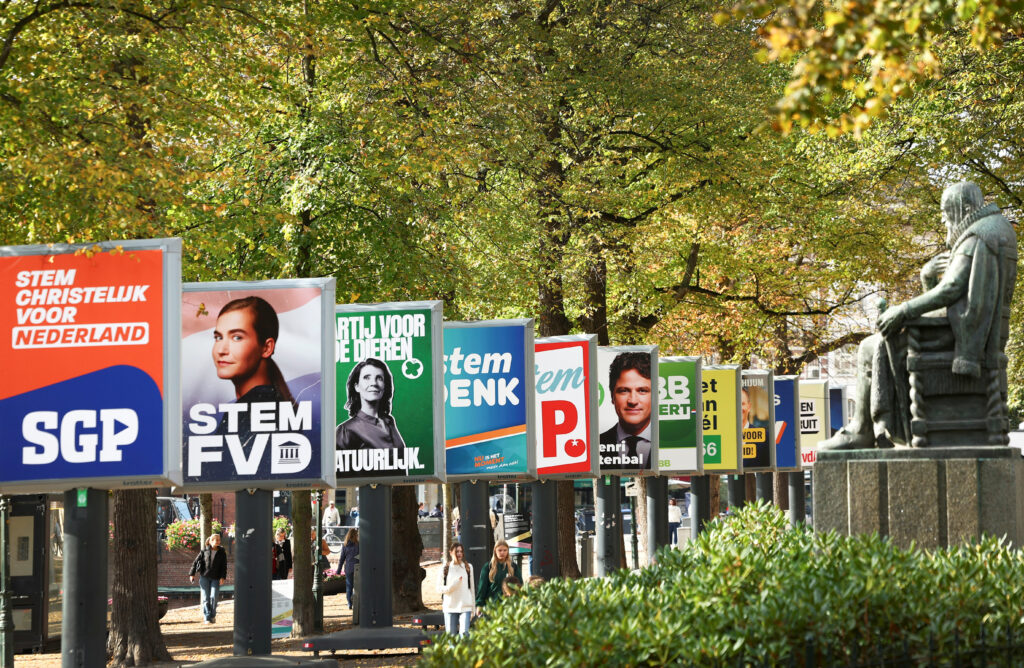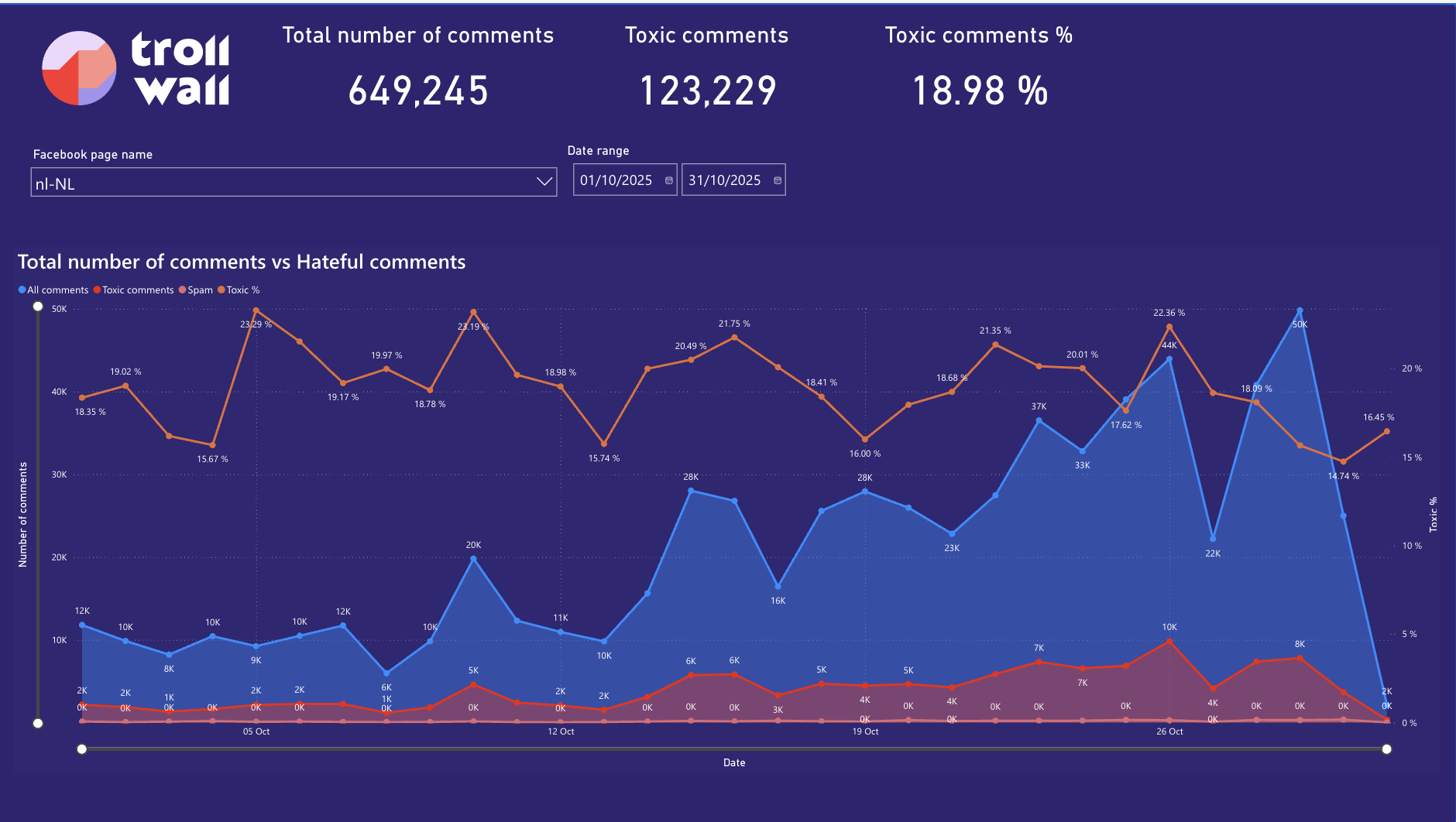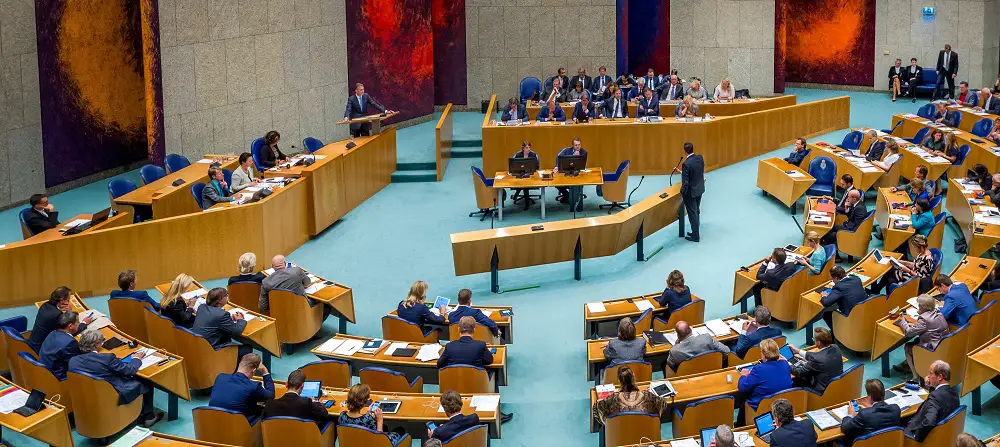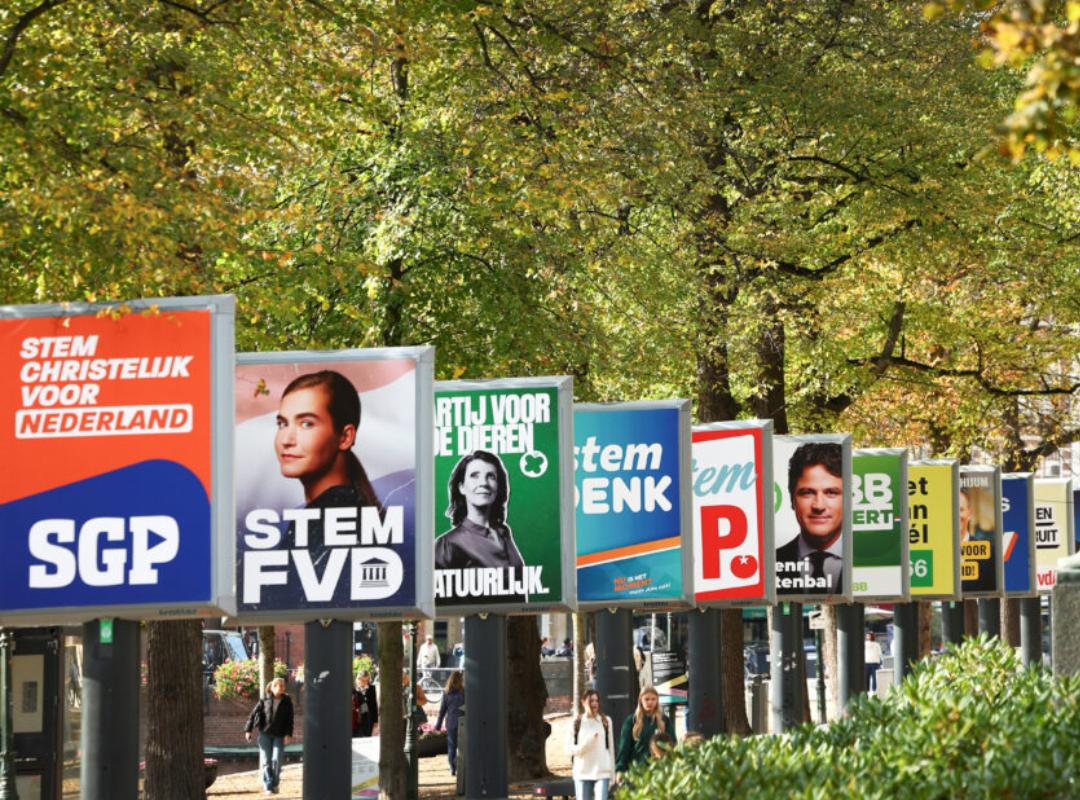The Dutch snap general election on 29 October 2025 ended in a near tie between Democrats 66 (D66) and Geert Wilders’ Party for Freedom (PVV), each winning 26 seats in the 150-member parliament. Led by 38-year-old Rob Jetten, D66’s progressive-centrist victory marked a generational and ideological shift in Dutch politics. The election followed the collapse of a short-lived coalition government that included the PVV, underscoring the country’s political volatility. Key campaign issues like immigration, housing, healthcare, and climate policy dominated public debate, and the result signalled a turn away from the far-right surge seen elsewhere in Europe, with progressive-centrist D66 achieving its best performance to date.

For us at TrollWall AI, this election presents a rich case for exploring the dynamics of social media commentary, online hate speech and political polarisation. With the near-tie result, the collapse of a government over immigration policy, and a strong pivot to the centre, the Netherlands gives us a perfect vantage to analyse how digital discourse reacts under such pressure points.
Hate stays consistently high throughout the election month

We have analyzed over 640,000 comments from the official Facebook pages of 28 major political parties and leaders in the Netherlands throughout October 2025 - the critical month leading up to election day on 29 October 2025.
Our findings reveal that hate and toxicity levels remained persistently high, with 123,229 toxic comments detected, representing an average toxicity rate of 18.98% across the conversation. The peak of toxicity occurred on 26 October 2025, just three days before the vote, when 9,820 toxic comments were recorded - 22.36% of all interactions that day.
This sustained level of hostility suggests that political discourse in the Netherlands - even amid the rise of centrist and progressive leadership - continues to be deeply polarised online. Rather than short bursts of outrage tied to isolated scandals, our data shows a steady undercurrent of hate speech, often amplified around key debates such as immigration, cost of living, and national identity.

Who Attracted the Most Toxic Comments?
| Rank | Page / Politician | Toxic Comments (Count) | Toxicity % | Hate % | Context in the 2025 Election |
|---|---|---|---|---|---|
| 1 | Geert Wilders (PVV) | 26,056 | 16.01 % | 15.16 % | The most commented-on politician in the Netherlands generated over 160K comments. His posts on immigration and crime fueled both supportive outrage and counter-hate, making him the central axis of digital polarisation |
| 2 | DENK (party page) | 15,161 | 34.13 % | 33.73 % | DENK’s pro-diversity stance attracted one of the highest hate ratios. Toxicity peaked around posts discussing Islamophobia and migrant representation. |
| 3 | Frans Timmermans (GroenLinks–PvdA) | 13,366 | 25.16 % | 24.51 % | As the left-green alliance leader, Timmermans faced heavy backlash tied to climate policy and pro-EU messaging, reflecting ideological fatigue among populist audiences. |
| 4 | BBB (BoerBurgerBeweging) | 11,747 | 19.97 % | 19.19 % | The agrarian protest movement remained divisive, with heated exchanges over nitrogen restrictions and rural–urban divides |
| 5 | SP (Socialistische Partij) | 7,891 | 22.18 % | 21.61 % | SP’s working-class rhetoric drew frustration-driven toxicity from both left and right audiences, disillusioned with mainstream politics. |
| 6 | CDA (Christen-Democratisch Appèl) | 6,023 | 15.46 % | 14.56 % | The centrist Christian Democrats saw moderate toxicity focused on their declining relevance and shifting voter base. |
| 7 | Forum voor Democratie (FVD) | 5,887 | 14.25 % | 12.60% | Baudet’s conspiratorial narratives kept engagement high but increasingly self-reinforcing, with toxicity coming mainly from detractors mocking his stance. |
| 8 | Volt Nederland | 5,365 | 26.37 % | 26.00 % | The pro-EU youth movement’s moderate tone met polarised reactions from both ideological ends, signalling how centrism now invites hostility. |
9 | Rob Jetten (D66) | 4,249 | 20.57 % | 20.32 % | As D66’s rising leader and eventual election winner, Jetten’s posts saw a steady rise in toxicity during debates over immigration and fiscal reform |
|---|---|---|---|---|---|
| 10 | Thierry Baudet (FVD) | 3,885 | 17.70 % | 16.32 % | FVD’s vocal populism and disinformation drew derision and counter-hate spikes, reinforcing polarisation cycles seen in earlier elections. |
The data reveals that high engagement doesn’t equate to positive sentiment. Figures like Geert Wilders and Frans Timmermans dominated online discussions, but their visibility made them central magnets for hate, with thousands of toxic interactions surrounding nearly every major campaign post.
Meanwhile, minority representation continued to face systemic abuse — both DENK and Stephan van Baarle’s pages exceeded 30% toxicity, underscoring how racial and cultural hostility remains deeply embedded in Dutch digital discourse.
A notable shift in this election was that centrists, too, became targets of polarisation: the inclusion of Volt Nederland and Rob Jetten among the most toxic pages highlights how even moderate voices now provoke antagonism in online debates.
A deep dive into toxic comments

Denk als Jimmy Dijk zich goed laat naaien door bruin tuig elk weekend in een darkroom 🤢
Imagine Jimmy Dijk getting screwed by some brown scum every weekend in a darkroom. 🤢
Die Jimmy Dijk is die gehandicapt? Er zijn nog wat restanten van zijne overgebleven! Die moet starten met andere medicatie 😳😂🤮
Is Jimmy Dijk handicapped? There are still some remnants of his left! He needs to start on different medication 😳😂🤮
"Heer" klaver?!? Zijn balletjes zijn nog niet eens ingedaald man!! Vreselijke babyface Feras!! 🤮🤣
"Sir" Klaver?!? His balls haven't even dropped yet man!! Horrible babyface Feras!! 🤮🤣
D66 is de pedofielen partij
D66 is the pedophile party
Vies narcistisch, egoïstisch stuk vreten! Het is alleen maar een dik verdienmodel voor jullie! Jullie geven geen zier om het milieu en het klimaat! Maar Karma komt wel langs, reken maar.....
You filthy, narcissistic, selfish bastards! It's just a lucrative business model for you! You don't give a damn about the environment and the climate! But karma will come, you can count on it...
LAAT U NIET AFLEIDEN DOOR DEZE VIEZE LINKSE RATTEN EN TRAP ER NIET IN!! STEM PVV!!
DON'T BE DISTRACTED BY THESE DISGUSTING LEFT-WING RATS AND DON'T FALL FOR IT!! VOTE PVV!!
The most toxic post of the month came from the Socialistische Partij (SP) on 25 October 2025, with 3005 and 43.7% of comments flagged as toxic and hateful. The post, shared just four days before the vote, appeared to mobilize strong emotional reactions around class and economic justice—topics that often polarize voters between populist left and right groups. A similar pattern was seen on 10 October, when BBB (BoerBurgerBeweging) recorded 46.3% toxicity, showing how debates around rural identity and environmental regulation can quickly turn hostile.
Frans Timmermans, leading the GroenLinks–PvdA alliance, featured heavily among the most toxic posts. Several of his campaign updates — particularly those from 15 to 23 October — exceeded 40% toxicity, with hate percentages in the same range. These peaks corresponded to key debates on climate policy and European cooperation, suggesting that his pro-EU and progressive stance became a lightning rod for populist backlash.
Geert Wilders, despite having the largest total comment volume, saw a more moderate but steady rate of toxicity ranging from 20% to 30% across multiple posts. His page recorded some of the highest daily totals of hate comments — notably on 26 October, when 9,599 toxic comments were detected — yet these were balanced between supportive outrage and counter-hate from opponents, illustrating the polarising duality of his online presence.
Conclusion
The Dutch election data underscores a clear reality: toxicity in online political discourse is no longer confined to the extremes — it follows attention. Whether populist, progressive, or centrist, every political actor who captured public interest also became a target for hostility. The most visible figures — from Geert Wilders and Frans Timmermans to Rob Jetten — faced consistent waves of toxic engagement, revealing that visibility, not ideology, is now the strongest predictor of hate online.
At the post level, the same pattern held true. Viral campaign updates and emotionally charged topics drew disproportionate levels of abuse, with several posts exceeding 40% toxicity. Issues tied to identity, immigration, and cultural belonging remained the most reliable triggers for hate speech, overshadowing policy debates on the economy or climate. Even moderate and pro-European voices, once considered less polarising, experienced significant backlash — showing how digital antagonism has expanded to include the political centre.
Taken together, the findings suggest that online hate during elections has become systemic, not situational. What was once reactive outrage has evolved into a constant undercurrent of polarisation that cuts across ideology and party lines. As campaigns become more digital-first, this persistent hostility poses a growing challenge not just for politicians, but for the health of democratic dialogue itself. TrollWall AI’s analysis makes clear that managing online toxicity via effective social media moderation is no longer a question of crisis response — it is an essential part of safeguarding public discourse and political narratives in every modern election.
Interested to see how TrollWall AI can take your political campaigns to the next level?
Disclaimer: Analysis is based on the Facebook comments extracted from major political pages below:
Geert Wilders, DENK, Frans Timmermans, BBB BoerBurgerBeweging, SP, CDA, Forum voor Democratie-FVD, Volt Nederland, Volkspartij voor Vrijheid en Democratie (VVD), Rob Jetten, Theirry Baudet, JA21, Henri Botenbal, Jesse Klaver, Jimmy Dijk, SGP, Stephan van Baarle DENK, Partig van de Arbeid (PvdA), Laurens Dassen, ChristenUnie, Nieuw Sociaal Contract, Mirjam Bikker, PVV - Partij Voor de Vrijheid, Chris Stoffer, Eddy van Hijum, Esther-Mirjam Sent
